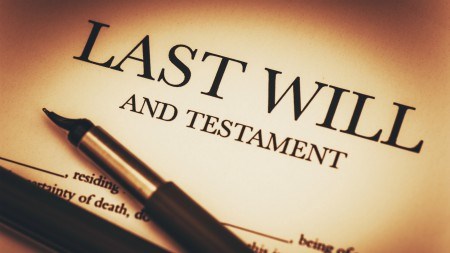If you own a property, ensure that you have a valid will, otherwise, it may not end up in the hands of the person/s you wanted to inherit the property.
Private Property asked Louis van Vuren, CEO of *The Fiduciary Institute of Southern Africa (FISA), to clarify some of the murkiness around the subject of last wills and testaments, how to properly, and legally, incorporate a property into them, and the consequences of not having a will at all.
What are the consequences of dying without a will?
When a person dies without a valid will, the rules of intestate succession apply. These rules apply to fixed property such as a house or block of flats, cash, investments, vehicles, etc.
In a nutshell, the rules of intestate succession work as follows:
- If the deceased person leaves a spouse without children, the spouse inherits the entire estate but only after the payment of debts, costs and taxes. A ‘spouse’ in this context also means a partner in a customary or religious marriage, or a same-sex partner in a long-term relationship, but not in a hetero-sexual life partnership.
- If the deceased person has a spouse and children, the spouse inherits a child’s share or R250 000, whichever is the bigger amount. Note that this applies only to the deceased’s own and adopted children but not the spouse’s children from another marriage or relationship. To determine a child’s share, the spouse is counted as a child together with the deceased’s own and adopted children.
- If the deceased does not leave a spouse or children (or other descendants), the estate is split 50/50 between the deceased’s two parents (natural or adopted parents). If the parents are no longer living, the inheritance will go to other descendants, such as siblings or their descendants.
- Adopted children inherit from their adoptive parents and not their natural parents, and vice versa – in other words the natural parents of an adopted child do not inherit from the child, rather the adoptive parents will inherit. Upon adoption all ties between the adopted child and its natural parents are broken, and the adoptive parents are regarded as the adopted child’s only parents.
In practice, however, it is difficult to apply the rules of intestate succession. For example, let’s assume the deceased leaves a spouse and two children. He/She owned a fixed property worth R3-million, as well as other assets worth R1-million after tax and debts and costs have been settled. The surviving spouse will inherit a child’s share, which will be one third of R4-million. Practically this means the surviving spouse will end up as a joint owner of the fixed property with the children. If the surviving spouse is not the natural parent of the deceased’s two children this may not be a desirable situation, or what the deceased intended.
How are joint heirs of a property impacted?
Other than agricultural land, which by law cannot be left to more than one person, all other fixed property can be bequeathed to more than one person, who become joint owners. This may be completely impractical in a situation where the joint heirs are not on speaking terms. There is no overall solution that can be provided because each case is unique, and therefore it is best to seek specialised advice. Leaving a property in a trust or company may be a solution but again this should not be attempted without professional advice.
What are the requirements for a valid will?
Anyone over the age of 16 can make a will. For a will to be valid in South Africa, it has to be a document that is signed by the testator (the person whose will it is) on each page and at the end of the document. Two witnesses who are over the age of 14, must also sign the will in the presence of one another and of the testator.
Anyone who will receive any benefit from the will is not allowed to sign as witness or write any part of the will. If they do, they will be disqualified from receiving their inheritance.
A will should form part of your estate plan and tie in with it. It is best to obtain professional advice to help with this process, as there are anywhere between 20 to 40 different pieces of legislation and regulations that could have an impact.
What should be included in the will?
At the very least the will should include:
- The full names and preferably also the identity or passport number of the testator;
- A statement that the will cancels all previous wills. There are pitfalls here if the testator has assets in more than one country;
- An indication whether heirs have to pay into the estate any donations made to them by the testator during the testator’s life or not;
- Special bequests (called legacies) of specific assets to specific heirs (for example you could say “I bequeath my house at 27 Smith Street, Emalahleni, to my wife,” meaning she will inherit it);
- A bequest of the residue of the estate after debts, costs and taxes have been paid and the legacies have been awarded to the legatees (the persons inheriting the legacies);
- The nomination of an executor to administer the estate; and
- If there is any chance that a person under the age of 18 years could inherit a large sum, it would be wise to include a clause in the will that a trust be established to hold the benefit at least until the heir turns18. This is referred to as a “will trust” or “testamentary trust”.
Example:
R800 000 in cash has been left to a minor (someone under the age of 18).
If the will does not mention that a trust should be set up for the minor heir, the executor of the estate must pay that money into the Guardian’s Fund at the Master of the High Court. The Guardian’s Fund invests those funds with the Public Investment Commissioner and pays the interest earned to the guardians of the minor.
If the minor is 13 years old, this means the balance (R600 000) will stay in the Guardian’s Fund for five years, which is when the child reaches the age of 18, and is considered an adult by law.
Let’s take this one step further. Assume that somewhere between the years aged 13 and 18 this child is diagnosed with cancer, and needs money for treatment. However, the law limits the amount of capital that can be released from the Guardian’s Fund for the benefit of the minor, to a cumulative total of R200 000, in other words for the whole period the inheritance is held in the Guardian’s Fund. Even though more funds would be needed for medical care of the child, this will not be allowed.
In contrast, had the money been left in trust for the benefit of the child, the trustees could have taken a sensible decision that would have been in the best interests of the child.
To write trust provisions into a will is not rocket science, but if you don’t know what you’re doing, you can mess it up completely.
What is the best way to include a property in the will?
A property must be described with sufficient clarity in a will to avoid any confusion, but exactly how this is done depends on the circumstances. A residential property, be that a freestanding home or a sectional title or shareblock, is best described by way of a street address, an erf number, or a unit number.
What is the role of an executor?
The executor can be nominated in the will and the Master of the High Court then appoints the executor to administer (wind up) the deceased estate. It is best to think carefully about who you should nominate as executor, because that person needs some knowledge of the law and how to carry out the wishes of the testator as set out in his/her will. If an executor does this without sufficient knowledge, they are walking into a minefield.
It may not be a good idea to nominate the surviving spouse or a close family member because the time after the death of a loved one is an emotional one and therefore not ideal for them to have to deal with the harsh realities of paying creditors, collecting debts and liasing with financial institutions and authorities.
Why use a fiduciary practitioner?
The value of appointing a fiduciary practitioner is, at least for the heirs of an estate, the unburdening of the weight of paperwork that has to be attended to. There is also the comfort of knowing that these are professionals who not only understand the law but can work through the legal system far quicker, can provide unbiased advice, and make decisions that are in the best interests of the estate.
The maximum executor’s fee is capped at 3.5% of the gross value of the estate, plus VAT if the executor is a VAT-registered vendor. In large estates it may be possible to negotiate a lower fee, however this depends on the asset structure of the deceased estate and how practical the provisions of the will are.
How important is it to have available cash in the deceased’s estate?
When doing estate planning it is very important to ensure there is enough cash available in the estate to cover the cash needs while the estate is being wound up. The cash will be used to cover costs such as settling the bond, paying council taxes, income tax, estate duty, other debts, and the costs of administration. An example of further costs is valuation fees for fixed property. The executor will pay all debts, costs and taxes first from the available cash in the estate, followed by bequests, with the residue going to the heir/s inheriting the residue in accordance with the will.
When there is insufficient cash available, the executor can sell the deceased’s assets to raise the cash required. This is not ideal as it could have further negative tax consequences. The only way to avoid this is if the heirs are willing themselves to pay cash into the estate to cover those costs.
Bear in mind that fixed property (like a house or a flat) usually cannot be transferred at the Deeds Office unless a rates clearance has been issued by the local authority, confirming that all municipal bills have been paid. The Deeds Office is responsible for the registration, management and maintenance of the property registry of South Africa. If you are planning on buying or selling a house or a flat, it can be useful to familiarise yourself with the Deeds Office processes.
Who transfers the property into the heir’s name?
This is handled by the executor of the deceased estate, who instructs a “transferring attorney” (a lawyer specialising in the transfer of a property). All the heirs need to do is to provide the executor with the personal information the Deeds Office requires. .
Can a surviving spouse challenge a will?
A properly drafted and signed will cannot easily be challenged by anyone, because South African law gives the testator a very high degree of freedom to bequeath his/her assets to whomever they want.
A will can be challenged on the basis that the testator was not in “sound and sober” senses when signing, or was unduly influenced or threatened to sign the will. However, if the deceased leaves the surviving spouse without sufficient support, taking into consideration the surviving spouse’s own resources, the surviving spouse can lodge a claim in terms of the law (the Maintenance of Surviving Spouses Act, 27 of 1990). It is the executor’s duty to accept or reject a claim of this nature. Such a claim must be for an amount of money, which is either settled in cash or by the transfer of assets.
If the couple had been married under the accrual system, the surviving spouse may have an accrual claim depending on whether the deceased’s estate or the surviving spouse’s estate showed the higher growth during the marriage.
If the couple had been married in community of property, everything belongs to both spouses in equal undivided shares. Each spouse can therefore only bequeath his/her own half of the assets. In the case of a joint will, where the estates are massed and the will then bequeaths both parties’ assets upon death of the first of them, the survivor will have the option to accept or reject the will.
Conclusion
The best advice that Van Vuren can give is two-fold:
• Get expert advice when planning your estate and having a will drafted.
• Think twice before nominating a family member or a friend, or even a friend’s friend, as the executor of your estate.
•(FISA is a professional institute representing fiduciary practitioners in South Africa. The fiduciary industry includes the activities of those involved in estate planning, drafting of wills, setting up and managing trusts, winding up estates, and so forth. FISA sets the bar for high professional standards and the public can be reassured that FISA members are bound by a code of ethics and a disciplinary code requiring them to act with integrity and diligence.)




